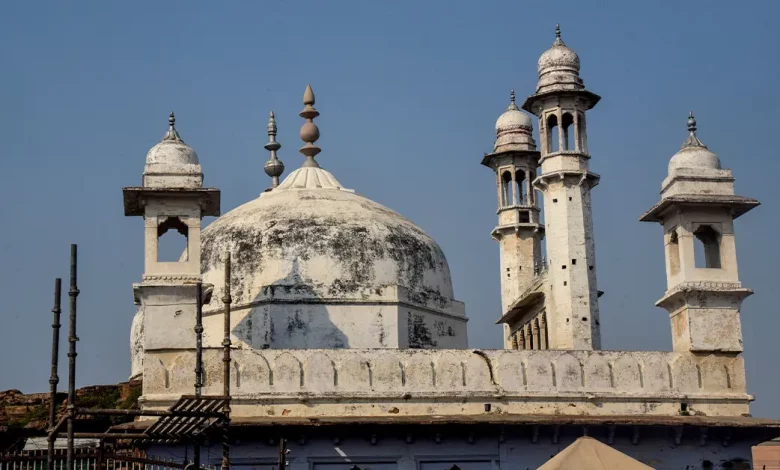Daily Current Affairs for UPSC
Status of the Ongoing Cases on the Gyanvapi Mosque
Syllabus- Polity (GS Paper-2)

Context- When the Babri-Masjid Ram Janmabhoomi dispute gained momentum, the Vishwa Hindu Parishad and other Hindu organisations recently took up the case of two other mosques — the Gyanvapi mosque in Varanasi and the Shahi Idgah in Mathura.
What is the Status of the Ongoing Cases on the Gyanvapi Mosque?
-
- A suit was filed in 2022 in the Varanasi district court by a set of Hindu women worshippers seeking to assert their right to worship deities they claim are still found on the premises of the Gyanvapi mosque.
- The plaintiffs say they have the right to worship Ma Sringar Gauri, Ganesh, Hanuman and other “visible and invisible” deities.
- Also pending is every other batch of suits filed in 1991 seeking a declaration that a part of the site of the Gyanvapi mosque belongs to Lord Vishweshwar.
- The fundamental basis for the suits is that the Hindu facet says that an antique temple of Lord Vishweshwar lies at the centre of the Gyanvapi compound.
- Court’s Judgement:
-
- So far, court orders have favoured the position that these suits aren’t barred by the Places of Worship Act.
- On the district court’s order, the Archaeological Survey of India (ASI) has conducted a survey of the premises.
- The ASI’s report, submitted to the Varanasi district court, claims that a temple existed there prior to the development of the mosque.
- Subsequently, the courtroom has allowed the conduct of Hindu prayers at a cellar on the premises.
What is the Status of the Ongoing Cases on the Mathura’s Shahi Idgah?
- The suits in Mathura pertain to the Shahi Idgah mosque that stands adjoining to the Krishna Janmabhoomi Temple there.
- These suits declare that the mosque became constructed over the birthplace of Lord Krishna. The mosque committee, but, denies the allegation.
- The dispute was settled through a compromise between the Sri Krishna Janmasthan Seva Sansthan and the Shahi Idgah Trust in 1968, and applied thru a decree in 1974.
- As part of the agreement, the Sansthan had given up a part of the land to the Idgah.
- The modern fits project this compromise as ‘fraudulent’ and are seeking the transfer of the complete parcel of land to the deity.
- The Allahabad High Court has transferred to itself all suits touching on the Mathura dispute.
Why Did the Places of Worship (Special Provisions) Act Not Cover Gyanvapi and Shahi Idgah?
- In both disputes, the respective mosque committees sought rejection of the fits on the grounds that the Places of Worship Act prohibits such litigation.
- However, courtroom orders thus far say the Act does no longer bar those suits and they have to pass on.
- In the Gyanvapi worshippers’ case, the ruling is that the suits aimed to claim the right of worship of the Hindu deities and did not seek to transform the reputation of the mosque.
- The Allahabad High Court has taken the view that the Act does not define the time period ‘non secular character’.
- A structure can’t have the dual character of being both Hindu and Muslim, and that simplest an exam of proof can determine its religious person.
- The Act can’t be an absolute bar on proceedings to envision its religious person, it held.
- Regarding the Mathura dispute, the district court has taken the view that the fits are not barred by the Places of Worship Act, as what’s below challenge is the compromise decree based on the 1968 agreement.
- As the decree was drawn up earlier than the graduation of the 1991 Act, it is not applicable to the case it has held.
About Places of Worship (Special Provisions) Act, 1991
-
- It is described as an Act to prohibit conversion of any region of worship and to offer for the preservation of the religious person of any place of worship.
- The Act proclaims that the religious character of an area of worship shall remain similar to it was on August 15, 1947.
- It says that no individual shall convert any place of worship of any religious denomination into considered one of a specific denomination or section.
- Exemption:
-
-
- The disputed web site at Ayodhya changed into exempted from the Act. Due to this exemption, the trial within the Ayodhya case proceeded even after the enforcement of this law.
- Any place of worship that’s an ancient and historical monument, or an archaeological site blanketed by using the Ancient Monuments and Archaeological Sites and Remains Act, 1958.
- A fit that has been eventually settled or disposed of.
- Any dispute that has been settled by the parties or conversion of any place that happened by acquiescence earlier than the Act began.
-
- Criticism:
-
- The regulation has been challenged at the floor that it bars judicial review, which is a basic function of the Constitution.
- It imposes an “arbitrary irrational retrospective cutoff date,” and abridges the right to faith of Hindus, Jains, Buddhists, and Sikhs.
Source: Indian Express





.png)



